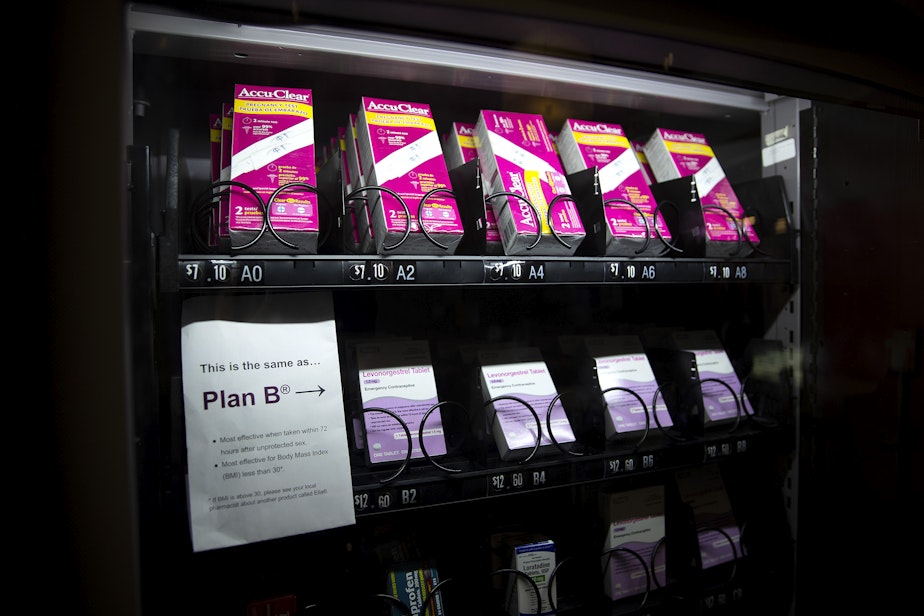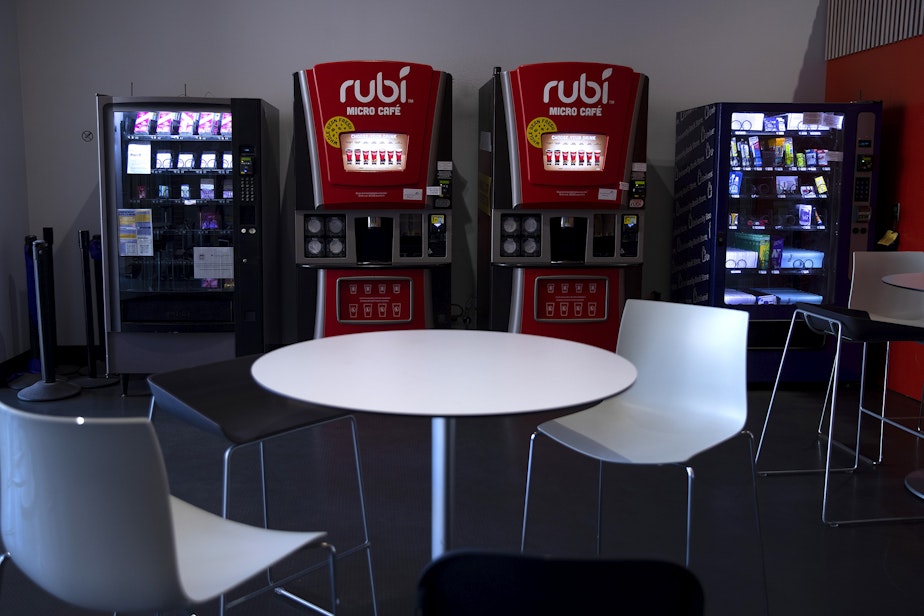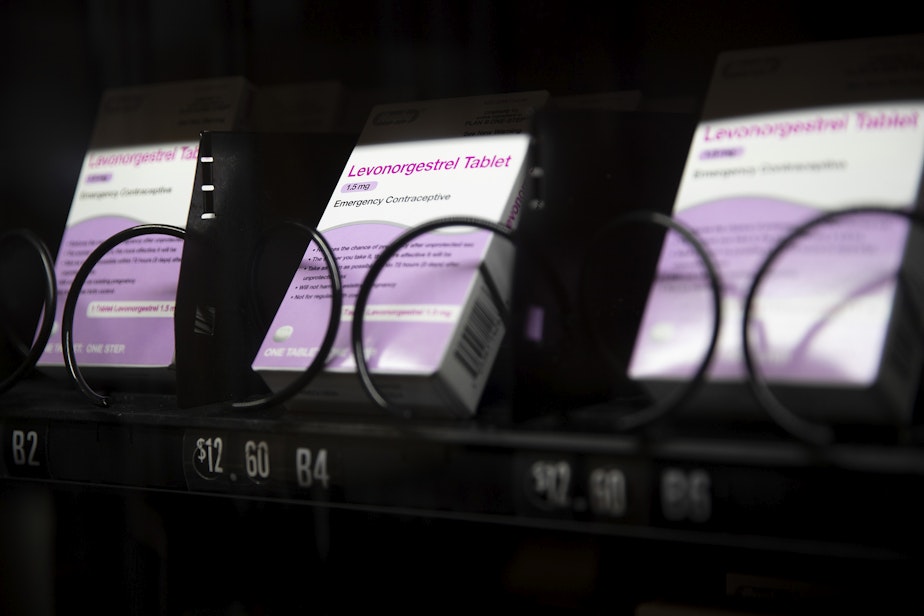A vending machine in Seattle that dispenses the morning-after pill

There’s a new kind of vending machine on the University of Washington campus.
It sells pregnancy tests, tampons, tylenol – and the morning-after pill for $12.60, packaged in purple and white boxes.
It’s one of three of these vending machines on Washington state campuses. And starting in 2024, public colleges and universities statewide will be able to get funding to install vending machines of their own. It’s all part of a national movement to make emergency contraception more readily available to college students — and some groups are pushing back.
The morning-after pill is often known by the brand name Plan B or, by medical providers, as emergency contraception. You have to take it within three days of having unprotected sex or a condom failing.
In the first three months after the UW’s machine went in, more than 300 contraception packages were sold. In the half-hour I was near the machine, a couple came by to buy a pregnancy test, fumbling with their credit card and the machine.
Among the advocates for the vending machine is Taylor Riley, a graduate student in public health at the University of Washington.
Riley said, back when she was an undergrad at a different school, she found herself needing emergency contraception.
Sponsored
“I was scared. I was nervous,” she said. “I wasn’t sure what to do or where to access it. It wasn’t available at our Student Health Center.”
Riley had to borrow a car to drive to a pharmacy, where she spent $50-60 for the pill.
That experience is part of the reason she thinks campuses should have these vending machines.
“Even in cities,” she said, pharmacies can run out of the pill, or “there can be pharmacists making people feel shame or stigma around it. And then in rural areas, there’s needing to get a car to get off campus to go to a pharmacy. And this is a time-sensitive need.”
Unintended pregnancy rates are highest among teenagers and young adults (girls and women ages 15-24). Also, sexual assault rates are high on college campuses, and condom use during sexual assault is very low.
Sponsored

Starting in 2024, Washington will become the first state to set aside money for emergency contraception vending machines for public colleges and universities statewide.
Washington’s vending machines are part of a national movement to make the morning-after pill more readily available on college campuses.
The effort has been ongoing for years, but interest has shot up since the Supreme Court knocked down Roe v. Wade.
“We’re giving them one more access point in terms of trying to prevent a pregnancy that’s unintended,” said Nicola Brogan, with the American Society for Emergency Contraception, which supports student activists who want to bring a vending machine to their campus.
Sponsored
Brogan said her organization is aware of 37 colleges and universities that have one of these vending machines. Three are in Washington state: the UW, Washington State University, and Eastern Washington University.
“Our first mission was to just get it into a place where it’s accessible on campus outside of health service hours, because most of them close at 5 p.m.,” Brogan said. “And let’s be real: You never need [emergency contraception] before 5 p.m. It’s usually the 11 p.m. run.”
Nearly one in four women have used emergency contraception at least once, according to the CDC.
Brogan said vending machines that sell over-the-counter drugs are legal in all 50 states, but that doesn’t mean it’s easy to get them installed. She knows of one student who has been trying to get a vending machine at her school for three years.
“She's being put through the runaround,” Brogan said. “They're really good at, like, stonewalling you, hoping that once the student graduates, this project loses interest and they don't have to worry about it.”
Sponsored
Emergency contraception can be controversial or misunderstood.
The FDA recently corrected the packaging on the morning-after pill, to clarify that it only works prior to ovulation and is not an abortion pill.
There has long been confusion about how the pill works; there’s even wrong information on sites like WebMD. The FDA's recent clarification of how the pill works says it blocks or delays ovulation and does not directly affect the uterine lining, and thus will not prevent the implantation of an already-fertilized egg.
Madison Greer is the president of Students for Life at Eastern Washington University, near Spokane. She said she’s not convinced by the FDA’s recent reversal.
“If the conception’s already happened, then Plan B is acting as abortifacient, which means an abortion is happening,” Greer said. Saying that the morning-after pill doesn’t cause abortions “is kind of like a lie because not the whole truth is being told,” she added.
Sponsored
Medical experts say that’s not accurate.
But this coming school year, Greer said her club plans to hand out pamphlets or cards telling students that emergency contraception is a possible abortion pill.
She said it would be difficult to get rid of Eastern’s vending machine — it’s been there since 2019 — but that is her long-term goal. She said a pharmacy is a better place to get this medication, because it’s often stored behind a counter, where customers have to ask for it.
“If you’re buying it over the counter, you’re talking to somebody,” Greer said. “There’s a chance to ask questions about the drug.”
Greer said she worries people who buy the morning-after pill in a vending machine won’t think through what’s in the pill and its potential side effects, such as headaches and nausea.

State representative Gerry Pollet, who represents northeast Seattle, Lake Forest Park, and Kenmore, helped get the vending machine funding into the state budget. Schools can apply for up to $10,000 to install a machine, and the total fund is $200,000.
Pollet said sexual assault survivors are among the college students he’s worried about.
He hopes the vending machine grants will go primarily to “campuses where emergency contraception is of restricted availability,” he said — such as rural areas, where there may not be pharmacies open seven days a week. He also hopes at least some of the machines end up near the Idaho border, so young people in Idaho have another way to avoid unintended pregnancies.
“We'll come back to look at the success in the first year, and add other campuses based on what we learn,” Pollet added.
Pollet said he views the vending machines as a first step toward comprehensive reproductive health services on all public college campuses in the state.
The student activists at the UW say campus access to medication abortions is their next goal, and they plan to push for that in the state legislature next year.




